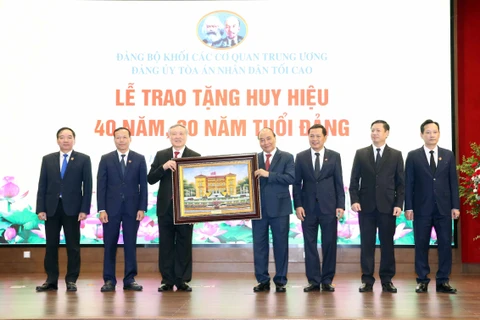 Chief Justice of the Supreme People’s Court Nguyen Hoa Binh addresses the conference (Source: https://tapchitoaan.vn/)
Chief Justice of the Supreme People’s Court Nguyen Hoa Binh addresses the conference (Source: https://tapchitoaan.vn/) The issue has received great attention from the Party and State with many resolutions, including Resolution 49-NQ/TW, and a relatively completed legal corridor that lay the foundation for the work.
In the 2005-2020 period, more than 70 judicial-related laws were issued, and the organisation and functions of judicial agencies completed.
Addressing the event, Chief Justice of the Supreme People’s Court Nguyen Hoa Binh said that over the years, judicial reform in courts has seen important outcomes, contributing to enhancing the prestige and operational efficiency of courts.
However, there are still many shortcomings in the sector, he said, stressing the need to continue to seek solutions to the problems.
Judicial reform is currently popular in the globe, therefore, if Vietnam is late at the work, the country will lag behind, especially amid the current integration and scientific development period, underlined Binh.
Highlighting the major principles in judicial reform activities, he said that the work must be implemented in parallel with the reform of law building and execution with clear tasks and responsibility of each agency, organisation and individual.
The overall goal of the work is to build an independent, professional, modern, equal, uncorrupted and effective judicial sector to serve the nation and people, he said.
Binh also pointed out nine major solutions to speed up judicial reform, including enhancing the personnel quality in courts, improving the infrastructure system, building electronic courts, and strengthening international cooperation in the field.
He said that the roadmap for judicial reform should be divided to two phases, with the first from now to 2030 and the second after 2030./.
VNA























